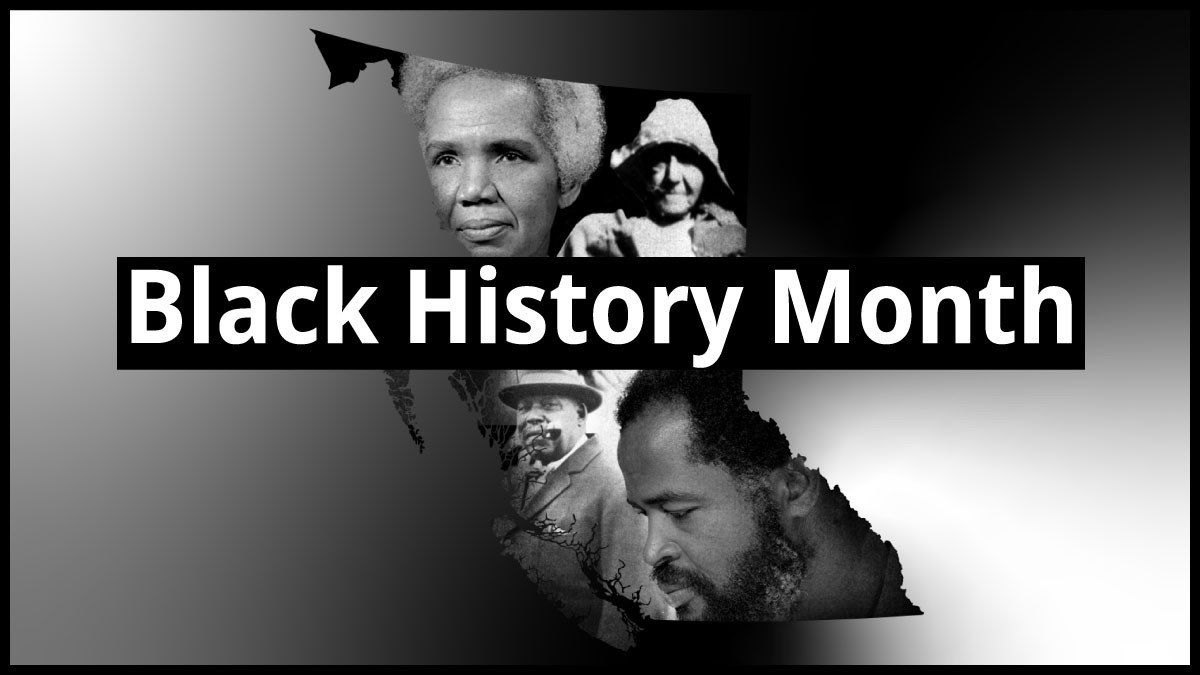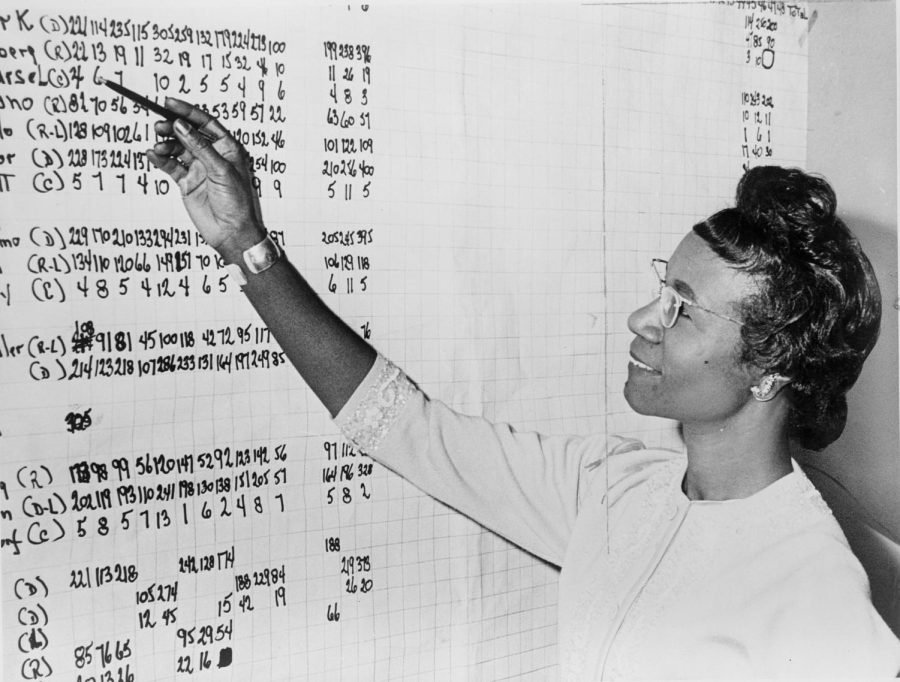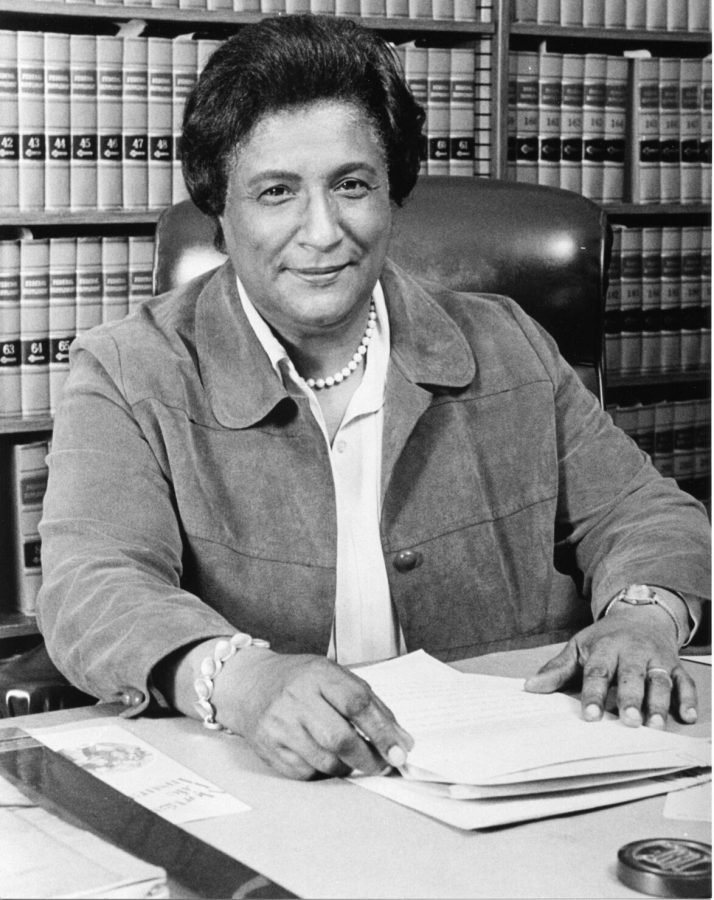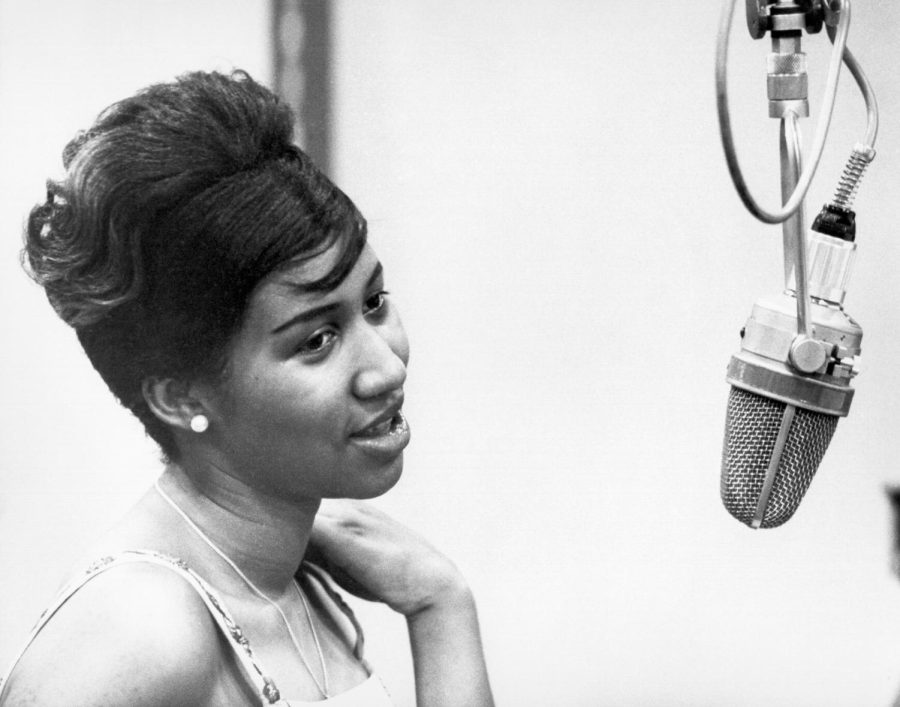Prominent Black women in history
February 4, 2022
This month is Black History Month. Typically you will hear about Harriet Tubman, Maya Angelo, Oprah, and Rosa Parks when you think of prominent Black women in history.
The truth is there are more women who have helped shape the black experience from the first-ever Black woman in Congress to the first Black woman in the Rock and Roll Hall of Fame.
Read below as we feature the life of a prominent Black woman each of the four weeks in Black History Month.
Shirley Anita St. Hill Chisholm
First African American woman in Congress
Photo via Flickr (GPA Photo Archive) under Creative Commons license
Shirley St. Hill Chisholm was the first African American woman to be in Congress and was widely known for her advocacy for women’s and minority rights.
Chisholm was elected to Congress under the district of New York in 1968. She also ran for the Presidential election in 1972, making her the first-ever African American and woman to run for the Oval Office.
Chisholm was an outspoken advocate for women’s and minority rights during her seven terms in the House of Representatives. Her motto and autobiography title were “Unbought and Unbossed.”
Born to immigrant parents in 1924, she later attended Brooklyn College and won prizes for debate. Her professors told her to consider a political career, but Chisholm often replied that she had a double handicap – being African American and female.
Originally Chisholm worked as a nursery school teacher. By 1951 she had a master’s degree in early childhood education from Columbia University. By 1960 she was the consultant of the New York Division of Day Care. She joined the chapters of the League of Women Voters, the National Association for the Advancement of Colored People, the Urban League, and the Democratic Party Club in Brooklyn.
A few years later, Chisholm ran and became the second African American in the New York State Legislature. In 1968 Chisholm ran for a seat in Congress and won after redistricting her heavily democratic neighborhood from a court order.
During her time in Congress, she introduced more than 50 pieces of legislation and championed racial and gender equality, fighting for the poor and ending the Vietnam War. Chisholm earned the nickname “Fighting Shirley.”
She was a co-founder of the National Women’s Political Caucus in 1971, and in 1977 became the first African American woman to ever serve on the House Rules Committee.
Chisholm retired from congress in 1983 and went on to teach at Mount Holyoke College and co-founded the National Political Congress of Black Women. When asked about her legacy Chisholm said “I want to be remembered as a woman who dared to be a catalyst of change.”
She passed away in 2005 at the age of 80. In 2015 she was awarded the Presidential Medal of Freedom.
Constance Baker Motley
First African American woman to become a federal judge
Connecticut Women’s Hall of Fame
Constance Baker Motley was the first African American woman to be a federal judge and was the first African American woman to argue in front of the Supreme Court.
Motley was an American lawyer, jurist, and legal advocate in the Civil Rights Movement, and the first African American woman to become a federal judge.
While other African Americans were out demanding the same rights as everyone else, Motley was fighting for them in the courtroom. Motley argued in front of the Supreme Court, making her the first African American woman to do so.
Motley was born on September 14, 1921, in New Haven, Connecticut, to immigrant parents. She graduated high school with honors. Her parents did not have enough money to send her to college, so she became a young activist who spoke in community events to earn funds to go to college.
It was during one of these events that a philanthropist heard her speak, and he was so impressed that he paid for her to attend New York University and Columbia University for law school. Motley soon became the legal attorney for the NAACP legal defense fund and began arguing desegregation and fair housing cases around the countries.
Motley went on to write the legal brief for the Brown vs. Education case, as well as represent Martin Luther King Jr numerous times. She won nine out of the ten cases she represented in the Supreme Court.
After Motley left the NAACP she went on to become the first African American woman in the New York state senate in 1964. The next year she became the first woman and African American to become the president of the Manhattan Borough. Then in 1966, President Lyndon B. Johnson appointed Motley judge of the United States District Court for the Southern District of New York. Motley presided from August 30, 1966, to September 30, 1986, when she was succeeded by Charles L. Brienat.
In her memoir, “Equal Justice Under Law,” Motley wrote, “I reject any notion that my race or sex would bar my success in life.” Motley was inducted into the National Women’s Hall of Fame in 1993 for her achievements in the government and the Connecticut Women’s Hall of Fame in 1998 for her achievements in politics, government & law. Motley died on September 28, 2005, at the age of 84.
Aretha Franklin
“The Queen of Soul”
Donaldson Collection/Michael Ochs Archives and Getty
Aretha Franklin, the Queen of Soul, was the first woman to be inducted into the Rock and Roll Hall of Fame.
Aretha Franklin was a gifted pianist and singer who won multiple Grammys and was dubbed “The Queen of Soul.” Her most notable songs include “Respect,” “Freeway of Love,” and “I say a Little Prayer.”
Franklin was born on March 25, 1942, in Memphis, Tennessee, the fourth child of five to Baptist preacher Reverend Clarence La Vaughan Franklin and Barabra Siggers Franklin, a gospel singer. Franklin’s musical gifts were apparent from a young age. Mostly self-taught, she was regarded as a child prodigy. A gifted pianist with a powerful voice, Franklin got her start in her singing career in front of her father’s congregation.
As a young girl, Franklin often traveled with her father’s revival show, a Christian service specifically for inspiring active members of a church to gain new followers and help people who had sinned to repent. By the age of 14, she had recorded some of her earliest tracks which were released by a small label. Franklin also befriended gospel greats Malahia Jackson and Sam Cooke.
In 1960, with her father’s permission, Franklin traveled to New York and signed with Columbia Records and released “Aretha.” Though two of her songs from the album reached R&B top 10, a bigger success would come with her single that same year called “Rock-a-Bye Your Baby with a Dixie Melody,” which landed at No. 37 on the pop charts.
Hitting her stride in 1967 and 1968, Franklin was releasing a string of hit singles that showcased her vocals and gospel roots in a pop framework. In 1967, the album “I Never Loved a Man (The Way I Love You)” was released. The first song on the album was “Respect,” an empowering cover of an Otis Redding track. It reached No.1 on both the R&B and pop charts and won Franklin her first two Grammys.
Franklin’s chart dominance earned her the title “The Queen of Soul,” while at the same time she became a symbol of Black empowerment during the Civil Rights Movement. In 1968, Franklin was chosen to perform a rendition of “Precious Lord” at Dr. Martin Luther King Jr.’s funeral. Later on that year she sang the National Anthem to begin the Democratic National Convention in Chicago.
In 1987, Franklin became the first female artist to be inducted into the Rock and Roll Hall of Fame, and she was awarded the Honorary doctrine from the University of Detroit. Then in 1993, she was invited to sing at the inauguration for Bill Clinton, and the following year she received both the Grammy Lifetime Achievement Award and the Kennedy Center Honors. She received the National Medal of Arts in 1999.
She would be awarded the Presidential Medal of Freedom in 2005 and was the second woman ever inducted into the UK Music Hall of Fame.
On August 16, 2018, Franklin died from pancreatic cancer at the age of 76 years old.
Alice Marie Coachman
First African American Woman to win a gold medal
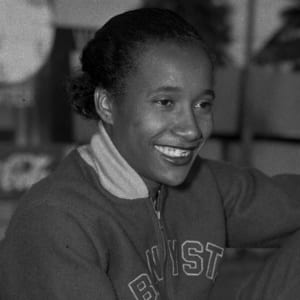
Photo via Biography.com (AP Photo)
Alice Marie Coachman was the first African American woman to win an Olympic gold medal as well as the first African American to earn an athletic endorsement deal.
Coachman made history in 1948 at the London Olympic games as a track and field athlete winning a gold medal as an African American woman. Coachman broke the record height of the long jump at 5 feet and 6 ⅛ inches.
Coachman was born on November 9, 1923, in Albany, Georgia, the oldest of ten children. She grew up in deep segregation, where she was often denied opportunities to train or compete in organized sporting events. Instead, she improvised her training by running barefoot in fields and on dirt roads, as well as using old equipment to improve her high jump.
In high school, Coachman attended Madison High School where the boys track coach Harry E. Lash helped train her. She caught the attention of the athletic department at the Tuskegee Institute in Tuskegee, Alabama, which offered Coachman a scholarship.
Her parents originally were not in favor of her pursuing her athletic dreams. Though before she ever stepped foot on the institute’s campus she ended up breaking the high school and college high jump records barefoot in the Amateur Athlete Union National Championships.
In 1946, she enrolled in Albany State College. That same year she ended up becoming National champion in 50 and 100-meter races, as well the 400-meter race and high jump. Due to World War ll, she was unable to attend the Olympics in 1940 and 1944.
During the Olympics in 1948, despite nursing a back injury, she set a record jump of 5 feet and 6 ⅛ inches, making her the first African American woman to win a gold medal. Her medal was presented by King George VI.
Following the Olympics, she graduated from the University of Albany and formally retired from athletic competitions though her stardom remained. In 1952, the Coca-Cola Company asked Coachman to become a spokesperson for the company, making her the first African American to earn an endorsement deal.
Later on in her life, she founded the Alice Coachman Track and Field Foundation to help support young athletes and provide assistance to retired Olympic veterans. Coachman has been inducted into the National Track and Field Hall of Fame and the U.S. Olympic Hall of Fame. During the 1996 summer Olympics in Atlanta, Georgia, she was honored as one of the 100 greatest Olympians in history.
Coachman died on July 14, 2014, at the age of 90.
Tina Turner
“The Queen of Rock ‘n’ Roll”
Steve Mandamadiotis/Dreamstime.com
Singer, songwriter, and actress Tina Turner, the Queen of Rock n’ Roll, has sold more than 20 million copies of her debut solo album “Private Dancer.”
Tina Turner is an American-Swiss singer who found success in genres of rock ‘n’ roll, rhythm and blues, as well as soul, in a career that spanned five decades.
Tina Turner was born Anna Mae Bullock on November 26, 1939, in Brownsville, Tennessee, to a sharecropping family. Turner began singing as a teenager, and when she moved to St. Louis, Missouri, immersing herself in the R&B scene.
In 1959 she met Ike Turner and began to perform with his band the Kings of Rhythm under the stage name Tina Turner. Soon her electric stage presence quickly made her the centerpiece of the show.
The ensemble, which toured as the Ike and Tina Turner Revue, was renowned for its amazing live performances but struggled to find recording success. That soon changed in 1960 when “A Fool in Love” hit the pop charts and a string of hit singles soon followed.
The Phil-Spector produced album “River Deep -Mountain High” in 1966 was a huge success in Europe. Tina and Ike’s final hit songs together were a Creedence Clearwater Revival of “Proud Mary” in 1971 and “Nutbush City Limits” in 1973.
After a series of guest appearances on albums of other artists, she released her debut solo album “Private Dancer” in 1984. It was a triumph both critically and commercially, selling more than 20 million copies worldwide and winning three Grammy awards, including the record of the year and best female vocal performance for “What’s Love Got to Do with It.” The single soon became Turner’s signature song.
She soon followed her musical success with a role in the film “Mad Max Beyond Thunderdome” in 1985. Later albums include “Break Every Rule” in 1986, “Foreign Affair” in 1989, and “Wildest Dream” in 1996. Her greatest-hits compilation “All best” was released in 2004.
Turner ended up writing two autobiographies, one in 1986 titled, “I, Tina,” which was later adapted into the film “What’s Love Got to Do with It?” in 1993. Then in 2018, she published “My Love Story,” as well as the self-help book called “Happiness Becomes You: A Guide to Changing Your Life for Good” in 2020.
Ike and Tina Turner were both inducted into the Rock and Roll Hall of Fame in 1991. She later received the Kennedy Center Honor in 2005, then went on to be given the lifetime achievement award in 2018. That same year the musical “Tina” was released to the public in London, and debuted on Broadway a year later.
Turner was inducted into the Rock and Roll Hall of Fame as a solo artist in 2021.

